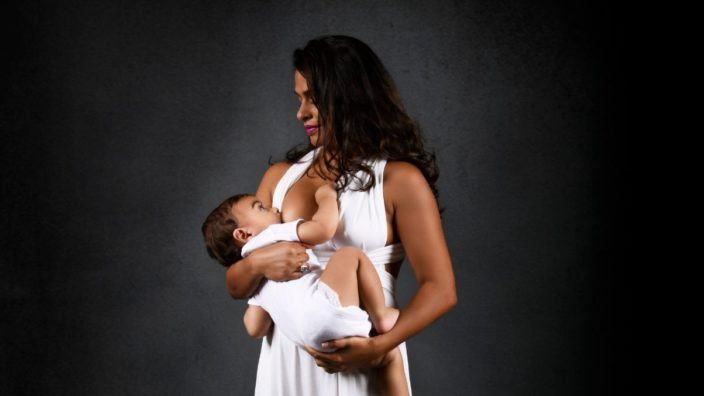1. Because it is a Huge Achievement
If we can exult Usain Bolt’s dedication, admire Eliud Kipchoge’s endurance, and encourage our friends and colleagues as they take on challenges ranging from the New York marathon to Spartan Hong Kong, why not celebrate the women who are literally growing humans with their own specially created super fuel day in, day out?
Women are effectively completing a Herculean triathlon: pregnancy, labour, and breastfeeding. If we can hold a ticker tape parade for sporting heroes, we can at the very least commend the people producing and nurturing our future.
Imagine if when our friends ran marathons, every time they dipped or talked of fatigue or pain, we said – have you considered giving up? What about driving there instead?
Imagine if whenever they posted their personal best time or training runs, we grumbled that they were insensitive to those with physical disabilities, or accused them of only doing it for attention.
Yet it’s common for breastfeeding women to hear they should stop, that formula would be more efficient and less tiring, that they shouldn’t go on about nursing because some women can’t, that they shouldn’t post pictures because it’s immodest and exhibitionism.
Breastfeeding in the modern era is a triumph of perseverance and determination, so it’s time to start talking to nursing mothers the way we talk to anyone else undertaking a physical and emotional feat – with respect and admiration.
2. Because it is Beautiful
In 1991, actress Demi Moore posed seven months pregnant and artfully nude on the cover of Vanity Fair. Yes, she was naked, but her arms covered her breasts, skimming past her belly and thighs, and there was nothing x-rated about the image. And yet thousands complained, outraged at the immodesty of it all. Walmart put the issue in the adult magazines section and insisted it was shrink-wrapped in the same way as pornographic magazines are. Other supermarkets refused to sell it at all. The magazine’s editor at the time, Tina Brown, described her decision to publish it as ‘simply a celebration of the essence of womanhood’ and yet many called for it to be banned. People had become unused to seeing pregnancy showcased in this way and so it seemed obscene.
Thirty years on, that reaction seems ridiculous. The pregnant female form is once more valued as a thing of art and wonder, and this type of image is offered by maternity photographers as standard. Recently Moore’s photo was hailed by Time magazine as one of the top 100 most influential images of all time.
But today, posting an uncovered nursing shot can provoke a similar hysterical response as the Vanity Fair picture did all those years ago. This is a bizarre position, particularly given that breastfeeding has been vaunted and honoured in art and imagery for centuries – from Babylonian sculptures and Madonna and child iconography to the works of Picasso and Gauguin.
The public has grown used to seeing and celebrating the pregnancy, but breastfeeding openly remains something of a taboo. People struggle to cope either with the sight of breasts being used for their primary purpose or, inexplicably, think it is a provocative act.
Let’s make sure it doesn’t take another three decades for society to understand this central tenet in the beauty of motherhood.
3. Because One Day, it Could Be You
OK so you’re not a parent now, but one day you might be, and regardless of gender things are going to go much more smoothly if you are prepared.
Here’s the thing, breastfeeding may be natural but that does not make it easy. It is a learned skill that takes time, effort, and a lot of support to master.
We’ve all seen the images of new mothers blissfully nursing – and while there are times it is blissful, there are also times that it causes blood, sweat, and tears.
For the past few generations, breastfeeding has been hidden away and because of this, it is seen as an unusual act rather than the biological norm. As a result, it can come as a shock to new parents that it is exhausting, that it can be painful, that newborns don’t follow the clock, and that they nurse when they are hungry, thirsty, for comfort, and for reassurance. Women and their partners are so unused to seeing the reality of what breastfed babies need, that they begin to think they are doing something wrong, that they are not producing enough milk, or simply that they have failed.
Like any skill humans have to master, we need to see it in action first, and we need to be paying attention to the pitfalls in order to know how to avoid or cope with them.
Breastfeeding has been hidden in the shadows for too long, we need to bring it into the light. Not just for us feeding now, but those feeding next.
4. Because Breastfeeding is a Feminist Issue
At the heart of this is two things: a woman’s right to make fully informed choices and a women’s right to execute those choices free of harassment
(Part I) We should all support a woman’s right to make fully informed choices:
Let’s be clear, the decision to breastfeed or not is personal and comes down to what is best for both mother and baby. The issue is that many women are not being given all the information to make the best decision.
Formula can be life-saving in many ways, but the industry has spent decades undermining breastfeeding. Initially pitched as a nutritionally superior option, now that’s been debunked, it’s often presented as practically superior: The answer to everything from frequent night waking to cluster feeding.
What many women aren’t told is that it is not the biological norm for human babies to sleep through the night and that frequent nursing is part of mother nature’s way of increasing milk supply.
So many women believe they’ve failed, they believe they have poor milk supply, when in fact they haven’t – they have been failed by those who do not understand how breastfeeding works, and the only thing wrong with their supply is the poor advice given on how to maximise it. Hospitals provide very little proper post-partum support, and private lactation consultants can be hard to find (and afford). In short, the village has been lost, and with it the knowledge that made breastfeeding more manageable. If you believe in a woman’s right to education, then it should be all education, including maternal and infant health.
(Part II) We should all support a woman’s right to execute those choices free of harassment
Once women have surmounted considerable hurdles and managed to breastfeed, they then face the tyranny of arbitrary social mores. If you agree that women should be in control of their sartorial choices, and not face harassment for them regardless of what those choices are, then that should extend to how, where, and when women breastfeed. In societies where women’s uncovered bodies are used to sell and seduce, there should be no rules about how they are used for nourishing children.
5. Because You Understand Evolutionary Biology
Breast milk is the wondrous result of millions of years of evolutionary biology, a superfood uniquely tailored to each human child, and breasts are the original zero-waste packaging. But because nursing has been hidden away, we have come to see breasts as something solely for titillation and seduction. We are more familiar with them on billboards shouting ‘Hello Boys’ than seeing them used in their primary purpose – to nourish.
It’s time to change this skewed attitude to women’s bodies. People of science (or even just logic) need to stand up for all breastfeeding mothers out there and counter the critics with rational thinking. Put simply, if you’re uncomfortable seeing a woman meet her kid’s basic needs, the problem lies with you.
6. Because Breastfeeding Brings Broader Health Benefits
The World Health Organisation has long extolled the virtues of breastfeeding. It’s immunological benefits help protect the infant against infectious and chronic diseases, it can help reduce the risk of SIDS, and it helps for a quicker recovery during illness. Breastfed babies are less likely to be overweight or have diabetes when they are older. It also contributes to the well-being of mothers, reducing risks of breast and ovarian cancer, osteoporosis and cardiovascular disease.
Well great for them, you might think, but actually, these benefits reduce the economic burden at a national level as it means public money, or taxes, spent on these health issues can be redirected. So it could be good for you too.
7. Because Women are Expected to do More for Less
Almost every economy wants women in the workforce, almost every nation wants women to grow their population, and almost every health authority wants higher breastfeeding rates.
But few are providing proper resources for women to deliver all those things. The World Health Organisation says women should breastfeed exclusively for at least the first six months. In Hong Kong, despite the fact that more than 86% of women try to nurse before they leave the hospital just 27% of women reach that WHO target.
Why? A combination of factors wear down even the most determined women: hospitals remain ill-informed about breastfeeding and in some cases push formula when it is not really necessary, there is very little post-partum maternal care, and for those that do battle through and master the skill – maternity leave is set at 10 weeks. Then they face pumping breastmilk in environments that are at best unwelcoming and uncomfortable – and at worst hostile and unsanitary.
If we want mothers to succeed in the workplace and at home, then we have to value their contribution and make adjustments to facilitate that. Just because someone has flexible hours, or has pumping breaks, doesn’t mean they are getting extra time off. It means they are exhausting themselves trying to do two jobs well while getting recognition for their efforts in neither.
8. Because Women Were Never Meant to be Doing it Alone
Breastfeeding is at the core of human evolution but our social lives have evolved differently. Women were never meant to be nursing alone. We were never meant to be cooped up in a quiet corner of our home desperately wondering to ourselves if we are doing it right, if the latch is good, why it hurts, and if baby is getting enough. Breastfeeding is the biological norm and yet somehow today we are fighting to normalize it. It was always meant to be woven seamlessly into our daily lives – done whenever, however, and wherever was necessary. We were meant to support each other, share the knowledge, the burden, the pain and the joy. How has it come to be seen as an act to be ashamed of, to be hidden away?
** All photos by Eva Thieulle, Eva Portraits and Styling by Joanna Worthington Collins
LT Thomas is a journalist with more than 15 years’ experience. She is also the co-founder of the #Ittasteslikelove campaign to normalise breastfeeding in Hong Kong
Be part of the campaign: #Ittasteslikelove
Follow along on: Facebook, Instagram
Campaign work: https://ittasteslikelove.wordpress.com/







